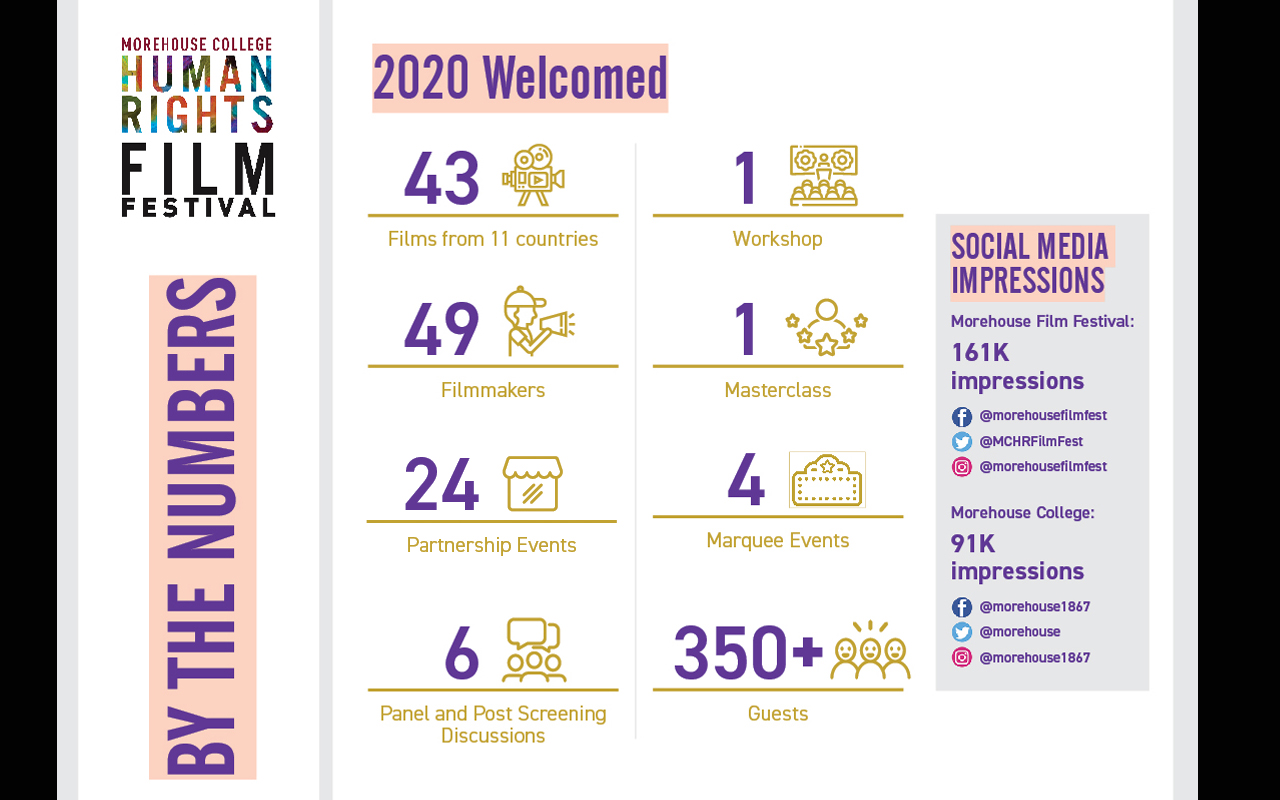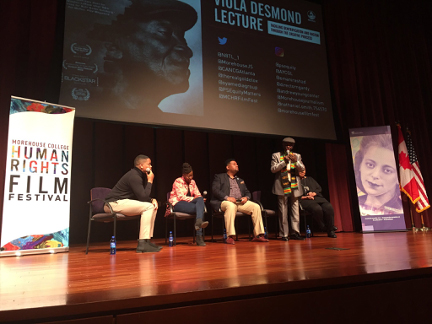
2020 Year-in-Review
The Morehouse College Human Rights Film Festival is still in its infancy as a project, holding its first event in 2019. While some might argue that as a young festival, we’ve attained a respectable measure of success premiering signature films like Harriet and American Skin and playing host to nearly 700 guests, including Academy Award winning Spike Lee, acclaimed actors Nate Parker and Omari Hardwick, and one of the pioneers of Hip Hop, Rakim, as organizers, we saw our second year as a huge challenge. However, we rolled up our sleeves and began organizing and developing programming for this year.
January 2020
Our team sat on the planning committee for the annual King Commemoration celebration sponsored by the office of the Morehouse College Martin Luther King Collection. As our contribution to programming, we held a one-day film fest featuring two films— Olympic Pride, American Prejudice from filmmaker Deborah Riley-Draper, and Child of Nature from filmmaker Marcos Negrão. Each screening was followed by an interview with the directors.
The day of the mini-festival, attendees were treated to an impactful exhibit featuring poster-sized photos of the 18 athletes who participated in the 1936 Berlin Olympic Games. Those images lined the lobby of the Shirley A. Massey Executive Conference Center (venue for the event). Key lesson learned: Always take photos of the event set up.
February 2020
 During Black History month, in partnership with Morehouse College Journalism and Sports Program, and the Andrew Young Center for Global Leadership, we presented a film screening and panel discussion for “Mr. Jane and Finch,” a film by Black Toronto Filmmakers of Oya Media Group. The film explores gentrification and Black racism in Canada, and the use of film and social media to support community activism. The event was co-hosted by Professor Mikki Harris and the Consul General of Canada in Atlanta, Nadia Theodore.
During Black History month, in partnership with Morehouse College Journalism and Sports Program, and the Andrew Young Center for Global Leadership, we presented a film screening and panel discussion for “Mr. Jane and Finch,” a film by Black Toronto Filmmakers of Oya Media Group. The film explores gentrification and Black racism in Canada, and the use of film and social media to support community activism. The event was co-hosted by Professor Mikki Harris and the Consul General of Canada in Atlanta, Nadia Theodore.
PANELISTS
Winston LaRose – Toronto Community Activist
Ngardy Conteh George – Producer/Director/Editor, Oya Media Group
Alison Duke – Producer/Director, Oya Media Group
Nathaniel Smith – Founder/Chief Equity Officer, Partnership for Southern Equity
Check out our Facebook photo album.
And then, a worldwide pandemic…
At first, like most festivals set for the fall, we remained hopeful and continued to plan for an in-person event in September. But, as the Coronavirus numbers began to rise, it became clear that we had two options: to cancel or to shift.
Kara: My first concern was for the filmmakers who had not only invested time, money and resources into producing films, but had also submitted their work for an opportunity to showcase their films at our festival. For that reason alone, I don’t think I ever seriously thought about cancelling the event, more than I thought ‘how do we make this work?’ I’d taken part in virtual events before, so in the back of my mind, I always knew there were other ways to bring people together. Thankfully, the company that we used last year to showcase, promote and sell tickets online was able to develop a solution that allowed us and many other festivals to present films in a virtual space to our audience.
Jenn: While great, holding a virtual event presented certain challenges that were difficult to anticipate. Utilizing a newly created online platform in lieu of face-to-face interactions and show times meant for more production prior to the event. Additionally, concerns arose around participation and engagement. We decided to face these challenges head on and plan for success, despite a global pandemic.
Through the power of social media and online resources, we were able to spread the word that our second annual event would be held… virtually. We showcased 40 films, along with several workshops and panel discussions to an audience that tuned in from the safety and comfort of their homes across the globe.
Film director Adam Stone: “As most independent filmmakers realize; some festivals have adapted well to going online-only and others have not. The Morehouse College Human Rights Film Festival did an excellent job of adapting.”
Key Lessons Learned:
- Virtual festivals are cost-effective. Our overhead was much lower as we were able to eliminate costs associated with catering, hiring additional personnel and securing venues.
- Sponsorship and partnership is key. Our sponsors and partners supported our efforts to develop programming and promote the festival.
- Don’t cancel. Make a shift. Thinking outside the box is not out of style. And the saying “where there’s a will, there’s a way” still holds true. 2020 taught us that.
At the time of this article, a vaccine for COVID-19 has just been approved and Americans have already started getting vaccinated. Many predict that life will be back to normal by the fall of 2021 and we’ll all be holding in-person events again.
Although we are excited to bring together filmmakers, human rights organizations, and festival attendees again next year, we have decided that a hybrid model merging plans from the 2019 physical festival and the 2020 virtual festival will allow for greater flexibility, accessibility and inclusion.
